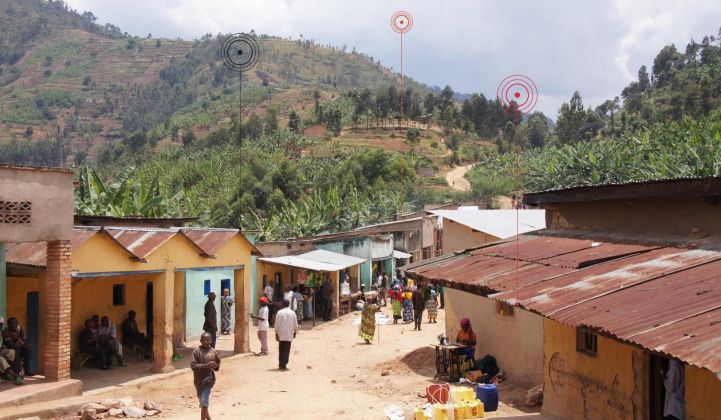Bboxx, a startup delivering pay-as-you-go solar PV plans to hundreds of thousands of African homes, has landed a $50 million investment led from Japanese industrial giant Mitsubishi, marking another major funding milestone in the off-grid solar market.
An Imperial College London spinout launched in 2010, Bboxx has installed about 200,000 home solar systems across Africa, many of them coffee and vanilla bean farmers living off-grid. It networks its solar systems and inverters via its Pulse monitoring technology, which allows it to charge customers on an installment plan, pay-as-you-go basis, using “mobile money” platforms common in the cellphone-connected markets it serves.
Roughly 600 million of Africa’s 1.2 billion residents lack grid electricity, making it a key market for off-grid solutions featuring the increasingly cost-effective tools of solar panels and wireless payment plans. Wednesday’s announcement notes that the startup plans to use the new funding to expand its African operations, which now span 12 countries, as well as target new markets in Asia, where it has already opened an office in Karachi, Pakistan.
Other investors include Engie, the French energy giant that’s made other off-grid solar investments, including its 2017 acquisition of East African home solar installer Fenix International; Luxembourg-based investment fund Bamboo Capital Partners; Dutch investment fund DOEN Participaties; and Canadian growth equity fund MacKinnon, Bennett & Company.
According to a March report from Wood Mackenzie Power & Renewables and Energy4Impact, investment in off-grid energy access — primarily residential solar to power lights, cellphones and other household devices, but including microgrids that power entire communities — has risen from nearly nothing in 2010 to a total of nearly $1.7 billion at the end of 2018.
More than $1.2 billion of this investment has occurred over the past two years. A growing share of this money is coming from corporate strategic investors, ranging from oil and gas majors like Shell and Total, European utilities like Engie and EDF, and energy technology providers like Schneider Electric.
Overall, the solar home system market has raised more than $1.1 billion through 2018. Some of the biggest investments include Zola Electric (formerly Off Grid Electric) with $261 million, M-Kopa Solar with $194 million, D.Light with $188.5 million, Lumos with $108 million, Greenlight Planet with $82 million, and Mobisol with $79 million.
Mitsubushi’s power solution group will also lend its experience to Bboxx’s expansion, the release noted. The group operated about 6 gigawatts of net generation capacity globally as of mid-2019, including some wind and solar generation and energy storage.
It’s also playing a role in some major projects, such as the 1,000-megawatt Advanced Clean Energy Storage proposal for Utah, which would include compressed air energy storage, flow batteries, renewable hydrogen and solid-oxide fuel cells.
Bboxx hasn’t made batteries a central part of its offering, although it does offer a small 650-watt-hour system linked with a 300-watt solar array for “households and microbusinesses with unreliable grid connections.” It does offer liquefied petroleum gas stoves and canisters filled with biogas under a similar pay-as-you-go program, to allow them to replace more expensive and polluting cooking and heating fuels.
****
EDF, Engie, Zola Electric, Total Ventures, Lumos and other leading off-grid players will shed light on solar home systems and mini-grid market dynamics, sustainable growth strategies and technologies across Africa, Southeast Asia and Latin America at GTM’s upcoming Off-Grid Energy Access Forum, scheduled for October 2 in London.




